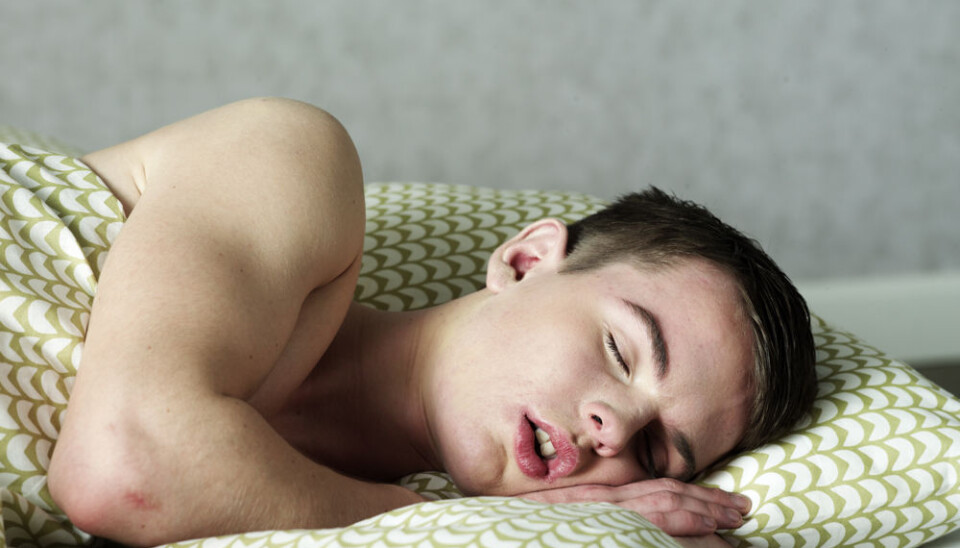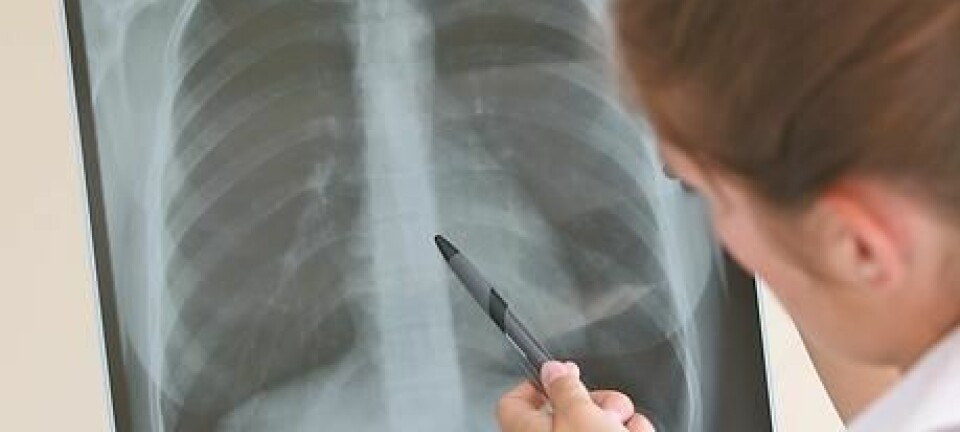
What’s the deal with morning breath?
While you sleep the bacteria in your mouth are forced onto a low-carb diet. They protest by gassing your breath with sulphur.
Denne artikkelen er over ti år gammel og kan inneholde utdatert informasjon.
You wake up from a long, good night’s sleep and stretch your arms, blinking as rise and adjust to the sunlight beaming through the window. You let out a big yawn. And your breath is far from a breeze of morning dew.
You can also waken from a daytime nap with a foul-tasting mouth.
But why do we get a bad taste in our mouth after sleeping in the middle of the day?
Scientists know the answer and can even recommend a way to ensure better breath when you wake up after all that crazy partying.
Spit
“It’s got something to do with spit,” explains Alix Young Vik.

She is a professor at the Department of Cariology and Gerodontology at the University of Oslo’s Faculty of Dentisty.
Some of Vik’s research has been focused on halitosis - bad breath - and saliva.
Around 90 percent of all cases of bad breath have their origin in the mouth.
“Chewing and eating stimulates salivation and one of the functions of spit is to cleanse the mouth of elements that can give us bad breath,” says the professor.
Open mouth

Vik says she hasn’t seen any studies indicating a reduced production of spit after just a couple hours of sleep.
“But if you sleep with your mouth open you can get a dry mouth,” she points out.
Dry mouths don’t get cleaned, which is why we get the bad taste in our mouths.
“This said, there isn’t much of a connection between what you taste and what your breath is like,” asserts Vik.
So that bad taste on your tongue isn’t necessarily polluting the air around you.
“But there can be a connection,” she adds.
But what is it that causes the smelly breath you can end up with after a long night’s sleep?
Carb-crazy bacteria
Vik explains that mouth bacteria primarily live on carbohydrates.
We don’t eat or drink while sleeping so the mouth bacteria have trouble finding nourishment.
They are compelled to go on a low-carb diet every night and have to switch to proteins, which are prevalent in our mouth.
“Our mucous membrane cells for instance contain proteins and the bacteria also find proteins in our spit,” the researcher explains.
The bacteria break down the proteins, and when something decomposes you get a residue or bi-product, in this case sulphur gasses.
“Hydrogen sulphide is the most common sulphur gas created in our mouth. It’s what makes rotten eggs smell as they do,” explains Vik.
Our saliva cleans the mouth in the course of the day but at night our spit production is low and the gasses can waft more freely
What’s the point in morning breath?
The researcher doubts that bad breath after sleeping has any practical natural function but the causes of it are useful.
“It would be pretty hard for us to sleep if we were producing spit as prodigiously at night as we do in the day, forcing us to swallow all the time,” says Vik.
Does this happen with all people?
“In general we all have bacteria in our mouths that can do this, so we all get our share of bad breath.”
“People with the gum infection gingivitis tend to have bigger problems with bad breath because there are more proteins fuelling the process,” says Vik.
Disease and age
Bad breath has nothing to do with age she says, but there is one thing that can increase camel breath among older people.
“Quite a few medicines reduce salivation and because so many elderly use medicines this can affect their breath,” she says.
You can also get a nasty taste in your mouth when you have a cold. Vik explains why:
“The bacteria are feasting on the mucous that runs from your sinuses to the back of your throat, breaking down the proteins in the snot so that once again you are getting sulphur gas production in your mouth,” she says.
The researcher’s advice for better breath
Groucho Marx is credited with the one-liner: “I wasn’t kissing her. I was just whispering in her mouth.”
Toothpaste ads often emphasize a product’s advantageous effects on your breath, sometimes hammering it home with a photogenic couple confidently puckering to kiss. Indeed, brushing your teeth and kissing do make a good match.
“It’s important to keep your teeth clean, and significantly, your tongue too,” says Vik.
The researcher also advises against skipping meals.
“Breakfast is especially important for stimulating the production of spit and it feeds carbohydrates to the bacterial flora.”
“You can also use mouthwash against bad breath but it should be unnecessary unless you have a persistent problem,” asserts Vik.
Water with your wine
When you wake up after partying the night before, you often have a cotton-mouth. Your tongue is like sandpaper and the fragrance of your breath is probably far from fresh.
This might be partly due to that kebab you ate on the way home, before falling into bed without undressing or brushing your teeth, but alcohol also has a more direct role.
“You can hardly expect to get more spit from drinking alcohol,” says Vik.
Alcohol has a tendency of drying out your mucous membranes. You probably also are dehydrated if you haven’t been smart about downing some water between each drink.
A glass of water between each drink is a good remedy for reducing hangovers, but it’s also advisable if you plan to wake up with someone next to you who you plan to breathe on.
The stomach has little impact
Your stomach can have an effect on your breath the next day. But in general your stomach doesn’t have much impact on your breath. Here too, alcohol can have an effect.
So says Idar Lygren who is a chief physician at the Department of Gastroenterology at the Ullevål University Hospital in Oslo.
“Alcohol hampers the body’s ability to empty the stomach. When you wine and dine you increase the amount of food residue in your stomach, which after a while can develop into bad breath.”
Most of us have also experienced that only drinking non-alcoholic beverages with meals is no guarantee against bad breath.
“Garlic, onions, strong cheeses, tobacco and coffee can all give leave a bad taste in the mouth and give you halitosis, but this is temporary,” says Lygren.
Gas or no gas
Medical researchers aren’t sure how bad smells from your stomach make their way to your mouth.
“Odours could rise through the oesophagus from the stomach. It’s debated whether bacteria in the stomach can create gases that cause bad breath but we don’t know enough about that to reach any conclusions,” says Lygren.
However, the chief doctor doesn’t think the stomach has an effect on the taste in your mouth after a teetotaller’s night of sleep.
—————————————————————————
Read the article in Norwegian at forskning.no
Translated by: Glenn Ostling































